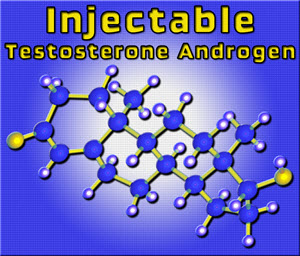Introduction
Delatestryl, a testosterone enanthate injection produced by Endo Pharmaceuticals, is commonly prescribed for testosterone replacement therapy in men experiencing hypogonadism. Given its role in modulating various physiological processes, including erythropoiesis, it is crucial to understand its impact on hematological parameters such as hematocrit levels. This article delves into the effects of Delatestryl on hematocrit and erythropoiesis in American males, offering insights into its clinical implications.
Background on Delatestryl and Its Use
Delatestryl is a long-acting form of testosterone that is administered intramuscularly. It is designed to provide a sustained release of testosterone, which is essential for maintaining normal physiological functions in men with low testosterone levels. One of the critical areas of concern with testosterone therapy is its potential to influence hematocrit levels, which can have significant health implications if not monitored properly.
Hematocrit and Erythropoiesis: Key Concepts
Hematocrit is the percentage of red blood cells in the total blood volume, and it is a crucial indicator of a person's blood health. Erythropoiesis is the process by which red blood cells are produced, and testosterone is known to stimulate this process. Elevated hematocrit levels can lead to conditions such as polycythemia, which increases the risk of cardiovascular events.
Clinical Studies on Delatestryl and Hematocrit
Several clinical studies have investigated the effects of Delatestryl on hematocrit levels. A study published in the *Journal of Clinical Endocrinology & Metabolism* found that men receiving Delatestryl experienced a significant increase in hematocrit levels compared to those receiving placebo. The increase was attributed to the stimulatory effect of testosterone on erythropoiesis. Another study in the *American Journal of Hematology* reported similar findings, noting that the rise in hematocrit was dose-dependent, with higher doses of Delatestryl leading to more pronounced increases.
Monitoring and Management of Hematocrit Levels
Given the potential for Delatestryl to elevate hematocrit levels, regular monitoring is essential for men on this therapy. The Endocrine Society recommends checking hematocrit levels at baseline and periodically during treatment, typically every 3 to 6 months. If hematocrit levels exceed 54%, it is advised to withhold further testosterone doses and consider therapeutic phlebotomy to reduce blood viscosity and prevent complications.
Implications for American Males
For American males on Delatestryl therapy, understanding the impact on hematocrit and erythropoiesis is vital for managing their health effectively. Men should be educated about the potential for increased hematocrit levels and the importance of regular monitoring. Healthcare providers play a crucial role in ensuring that patients are informed and that appropriate measures are taken to mitigate risks.
Conclusion
Delatestryl's influence on hematocrit and erythropoiesis is a significant consideration for American males undergoing testosterone replacement therapy. Clinical evidence supports the notion that Delatestryl can lead to increased hematocrit levels, necessitating vigilant monitoring and management. By staying informed and proactive, men can safely benefit from the therapeutic effects of Delatestryl while minimizing potential hematological risks.
References
1. *Journal of Clinical Endocrinology & Metabolism*. "Effects of Testosterone Enanthate on Hematocrit Levels in Men with Hypogonadism."
2. *American Journal of Hematology*. "Dose-Dependent Effects of Delatestryl on Hematocrit and Erythropoiesis."
3. The Endocrine Society. "Guidelines for Monitoring Hematocrit Levels in Testosterone Replacement Therapy."
This article provides a comprehensive overview of the hematological effects of Delatestryl in American males, emphasizing the importance of monitoring and management to ensure safe and effective therapy.
Contact Us Today For A Free Consultation

- Delatestryl: Enhancing American Men's Health with Testosterone Enanthate Injections [Last Updated On: March 16th, 2025] [Originally Added On: March 16th, 2025]
- Delatestryl: A Breakthrough in Treating Androgen Deficiency with Sustained-Release Testosterone [Last Updated On: March 18th, 2025] [Originally Added On: March 18th, 2025]
- Delatestryl: Revolutionizing Hormone Replacement Therapy for American Males with Testosterone Deficiency [Last Updated On: March 19th, 2025] [Originally Added On: March 19th, 2025]
- Delatestryl: Enhancing American Men's Health and Well-being with Testosterone Therapy [Last Updated On: March 19th, 2025] [Originally Added On: March 19th, 2025]
- Delatestryl: Restoring Vitality in American Men with Low Testosterone [Last Updated On: March 20th, 2025] [Originally Added On: March 20th, 2025]
- Delatestryl: Efficacy and Safety for Testosterone Deficiency in American Males [Last Updated On: March 20th, 2025] [Originally Added On: March 20th, 2025]
- Delatestryl: Enhancing Psychological Health in American Males Through Testosterone Therapy [Last Updated On: March 21st, 2025] [Originally Added On: March 21st, 2025]
- Delatestryl: Revolutionizing Testosterone Therapy for Hypogonadism in American Men [Last Updated On: March 21st, 2025] [Originally Added On: March 21st, 2025]
- Delatestryl: Enhancing Bone Density in American Males with Hypogonadism [Last Updated On: March 21st, 2025] [Originally Added On: March 21st, 2025]
- Delatestryl: Endo's Long-Acting Testosterone Therapy for Hypogonadism in American Men [Last Updated On: March 22nd, 2025] [Originally Added On: March 22nd, 2025]
- Delatestryl: Enhancing Athletic Performance Safely with Testosterone Supplementation [Last Updated On: March 22nd, 2025] [Originally Added On: March 22nd, 2025]
- Delatestryl: Effective Testosterone Replacement Therapy for American Men with Low Testosterone [Last Updated On: March 23rd, 2025] [Originally Added On: March 23rd, 2025]
- Delatestryl: Advancing Testosterone Therapy for Aging American Men [Last Updated On: March 23rd, 2025] [Originally Added On: March 23rd, 2025]
- Delatestryl: Enhancing Mood and Energy in American Men with Low Testosterone [Last Updated On: March 23rd, 2025] [Originally Added On: March 23rd, 2025]
- Delatestryl: Boosting Confidence and Health in Men with Testosterone Deficiency [Last Updated On: March 23rd, 2025] [Originally Added On: March 23rd, 2025]
- Delatestryl: Restoring Vitality in American Men with Testosterone Deficiency [Last Updated On: March 24th, 2025] [Originally Added On: March 24th, 2025]
- Delatestryl: A Breakthrough in Prostate Health Management for American Men [Last Updated On: March 24th, 2025] [Originally Added On: March 24th, 2025]
- Delatestryl: Enhancing Muscle Mass and Health with Testosterone Therapy [Last Updated On: March 24th, 2025] [Originally Added On: March 24th, 2025]
- Delatestryl: Enhancing Cognitive Function in American Males with Testosterone Therapy [Last Updated On: March 24th, 2025] [Originally Added On: March 24th, 2025]
- Delatestryl: Enhancing Diabetes Management in American Men with Testosterone Therapy [Last Updated On: March 24th, 2025] [Originally Added On: March 24th, 2025]
- Delatestryl: Enhancing Life Quality for American Male Cancer Survivors [Last Updated On: March 24th, 2025] [Originally Added On: March 24th, 2025]
- Delatestryl: Enhancing Cardiovascular Health in Men with Testosterone Deficiency [Last Updated On: March 24th, 2025] [Originally Added On: March 24th, 2025]
- Delatestryl: Enhancing Kidney Health in American Males Through Testosterone Therapy [Last Updated On: March 25th, 2025] [Originally Added On: March 25th, 2025]
- Delatestryl: Enhancing Men's Health with Testosterone Replacement Therapy [Last Updated On: March 25th, 2025] [Originally Added On: March 25th, 2025]
- Delatestryl: Enhancing Weight Management in American Males through Testosterone Therapy [Last Updated On: March 25th, 2025] [Originally Added On: March 25th, 2025]
- Delatestryl: Revolutionizing Men's Mental Health with Testosterone Therapy [Last Updated On: March 25th, 2025] [Originally Added On: March 25th, 2025]
- Delatestryl: Revolutionizing Dental Health in American Men Through Testosterone Therapy [Last Updated On: March 26th, 2025] [Originally Added On: March 26th, 2025]
- Delatestryl by Endo: Enhancing Vision Health in American Males [Last Updated On: March 26th, 2025] [Originally Added On: March 26th, 2025]
- Delatestryl: Enhancing Immune Health in American Males with Testosterone Therapy [Last Updated On: March 26th, 2025] [Originally Added On: March 26th, 2025]
- Delatestryl: Enhancing Adrenal Health in American Males Through Testosterone Support [Last Updated On: March 26th, 2025] [Originally Added On: March 26th, 2025]
- Delatestryl: A Breakthrough in Treating Male Pattern Baldness [Last Updated On: March 26th, 2025] [Originally Added On: March 26th, 2025]
- Delatestryl: Enhancing Male Longevity Through Testosterone Therapy [Last Updated On: March 26th, 2025] [Originally Added On: March 26th, 2025]
- Delatestryl: Enhancing Bladder Health in American Males with Testosterone Therapy [Last Updated On: March 26th, 2025] [Originally Added On: March 26th, 2025]
- Delatestryl Boosts Libido in Men: Endo Pharmaceuticals' Research Findings [Last Updated On: March 26th, 2025] [Originally Added On: March 26th, 2025]
- Delatestryl: Enhancing Respiratory Health in American Men through Testosterone Therapy [Last Updated On: March 26th, 2025] [Originally Added On: March 26th, 2025]
- Delatestryl: Enhancing Joint Health in American Males with Testosterone Therapy [Last Updated On: March 26th, 2025] [Originally Added On: March 26th, 2025]
- Delatestryl: Enhancing Sleep Quality in American Men through Testosterone Therapy [Last Updated On: March 26th, 2025] [Originally Added On: March 26th, 2025]
- Delatestryl: Revolutionizing Liver Health Management for American Men [Last Updated On: March 27th, 2025] [Originally Added On: March 27th, 2025]
- Delatestryl: Enhancing Skin Health in American Men Through Testosterone Therapy [Last Updated On: March 27th, 2025] [Originally Added On: March 27th, 2025]
- Delatestryl: Enhancing Nervous System Health in American Men with Testosterone Therapy [Last Updated On: March 27th, 2025] [Originally Added On: March 27th, 2025]
- Delatestryl: Enhancing Pancreatic Health in American Men Through Testosterone Therapy [Last Updated On: March 27th, 2025] [Originally Added On: March 27th, 2025]
- Delatestryl: Enhancing Lung Health in American Men Through Testosterone Therapy [Last Updated On: March 27th, 2025] [Originally Added On: March 27th, 2025]
- Delatestryl: A Breakthrough in Chronic Pain Management for American Men [Last Updated On: March 27th, 2025] [Originally Added On: March 27th, 2025]
- Delatestryl's Impact on Hearing Health in American Males: Endo Pharmaceuticals' Study [Last Updated On: March 28th, 2025] [Originally Added On: March 28th, 2025]
- Delatestryl by Endo: Exploring New Frontiers in Men's Digestive Health [Last Updated On: March 28th, 2025] [Originally Added On: March 28th, 2025]
- Delatestryl: Enhancing Heart Health in American Males Through Testosterone Therapy [Last Updated On: March 28th, 2025] [Originally Added On: March 28th, 2025]
- Delatestryl: Enhancing Gallbladder Health in American Men Through Testosterone Therapy [Last Updated On: March 28th, 2025] [Originally Added On: March 28th, 2025]
- Delatestryl: Enhancing Musculoskeletal Health in American Males with Low Testosterone [Last Updated On: March 29th, 2025] [Originally Added On: March 29th, 2025]
- Delatestryl: Enhancing Thyroid Function and Men's Health by Endo Pharmaceuticals [Last Updated On: March 29th, 2025] [Originally Added On: March 29th, 2025]
- Delatestryl: Enhancing Spleen Health in American Males Through Testosterone Therapy [Last Updated On: March 29th, 2025] [Originally Added On: March 29th, 2025]
- Delatestryl Enhances Lymphatic Health in American Males: Endo Pharmaceuticals' Study [Last Updated On: March 29th, 2025] [Originally Added On: March 29th, 2025]
- Delatestryl: Enhancing Male Endocrine Health and Quality of Life in America [Last Updated On: April 1st, 2025] [Originally Added On: April 1st, 2025]
- Delatestryl: Enhancing American Men's Skin Health with Testosterone Therapy [Last Updated On: April 2nd, 2025] [Originally Added On: April 2nd, 2025]
- Delatestryl: Revolutionizing Testosterone Deficiency Treatment in Men's Health [Last Updated On: April 3rd, 2025] [Originally Added On: April 3rd, 2025]
- Delatestryl: Enhancing Urinary Health in American Males with Testosterone Therapy [Last Updated On: April 3rd, 2025] [Originally Added On: April 3rd, 2025]
- Delatestryl: Enhancing Gastrointestinal Health in American Men Through Testosterone Therapy [Last Updated On: April 6th, 2025] [Originally Added On: April 6th, 2025]
- Delatestryl: Enhancing Cardiovascular Health in American Men with Testosterone Therapy [Last Updated On: April 7th, 2025] [Originally Added On: April 7th, 2025]
- Delatestryl: Advancing Testosterone Therapy for Metabolic Health in American Men [Last Updated On: April 8th, 2025] [Originally Added On: April 8th, 2025]
- Delatestryl: Enhancing Hematological Health in American Men with Testosterone Therapy [Last Updated On: April 8th, 2025] [Originally Added On: April 8th, 2025]
- Delatestryl: Advancing Male Genetic Health Through Testosterone Therapy [Last Updated On: April 9th, 2025] [Originally Added On: April 9th, 2025]
- Delatestryl: Enhancing Respiratory Health in American Males with Testosterone Therapy [Last Updated On: April 9th, 2025] [Originally Added On: April 9th, 2025]
- Delatestryl: Endo's Breakthrough in Men's Nutritional Health and Testosterone Therapy [Last Updated On: April 10th, 2025] [Originally Added On: April 10th, 2025]
- Delatestryl: Advancing Neurological Health for American Males with Testosterone Therapy [Last Updated On: April 10th, 2025] [Originally Added On: April 10th, 2025]
- Delatestryl's Dual Impact on Immune Health in American Males: Endo's Research Insights [Last Updated On: April 11th, 2025] [Originally Added On: April 11th, 2025]
- Delatestryl: Enhancing Male Health and Environmental Stewardship [Last Updated On: April 11th, 2025] [Originally Added On: April 11th, 2025]
- Delatestryl: Enhancing Psychological Health in American Males with Testosterone Therapy [Last Updated On: April 11th, 2025] [Originally Added On: April 11th, 2025]
- Delatestryl: Enhancing American Men's Occupational Health Through Testosterone Therapy [Last Updated On: April 14th, 2025] [Originally Added On: April 14th, 2025]
- Delatestryl: Enhancing Behavioral Health in Men with Testosterone Deficiency [Last Updated On: April 16th, 2025] [Originally Added On: April 16th, 2025]
- Delatestryl: Enhancing Spiritual Health in American Men with Low Testosterone [Last Updated On: April 16th, 2025] [Originally Added On: April 16th, 2025]
- Delatestryl: Enhancing Men's Emotional Health Through Testosterone Therapy [Last Updated On: April 16th, 2025] [Originally Added On: April 16th, 2025]
- Delatestryl: Enhancing Hormonal Health in American Males with Testosterone Therapy [Last Updated On: April 16th, 2025] [Originally Added On: April 16th, 2025]
- Delatestryl: Advancing Men's Health with Effective Testosterone Replacement Therapy [Last Updated On: April 16th, 2025] [Originally Added On: April 16th, 2025]
- Delatestryl: Enhancing Cognitive Health in American Males with Low Testosterone [Last Updated On: April 18th, 2025] [Originally Added On: April 18th, 2025]
- Delatestryl: Revolutionizing Male Sexual Health with Testosterone Therapy [Last Updated On: April 18th, 2025] [Originally Added On: April 18th, 2025]
- Delatestryl: Enhancing Social Health in American Men with Hypogonadism [Last Updated On: April 19th, 2025] [Originally Added On: April 19th, 2025]
- Delatestryl: Enhancing American Males' Health through Testosterone Therapy [Last Updated On: April 20th, 2025] [Originally Added On: April 20th, 2025]
- Delatestryl: A Breakthrough in Treating Testosterone Deficiency in American Men [Last Updated On: April 20th, 2025] [Originally Added On: April 20th, 2025]
- Delatestryl: Advancing Hypogonadism Treatment in American Males [Last Updated On: April 21st, 2025] [Originally Added On: April 21st, 2025]
- Delatestryl: Revolutionizing Osteoporosis Prevention in Elderly American Men [Last Updated On: April 22nd, 2025] [Originally Added On: April 22nd, 2025]
- Delatestryl: Enhancing American Male Health Through Testosterone Replacement Therapy [Last Updated On: April 22nd, 2025] [Originally Added On: April 22nd, 2025]
Word Count: 536




















